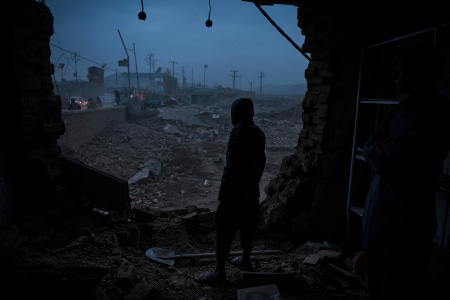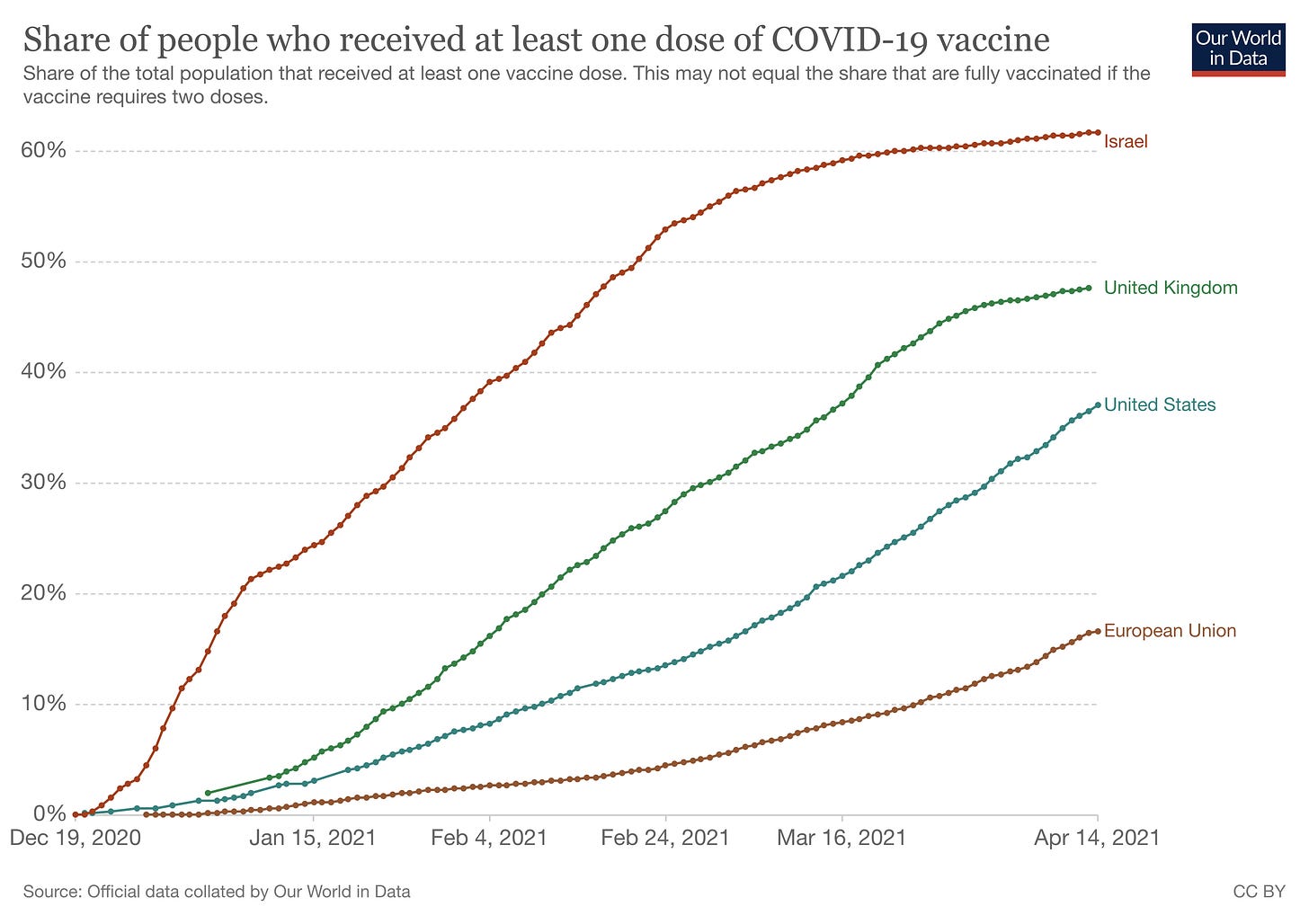Stedman Summaries #20
Om Afghanistan, John Boehners bekännelser, EU:s vaccinfiasko, perspektiv från dödsbädden och Djingis khans själs väktare
Får jag be om en tjänst? Det vore jättesnällt om du ville svara på en enkät med några korta frågor om vad du gillar med nyhetsbrevet och hur jag kan förbättra det. Det tar bara några minuter och du förblir helt anonym. Tack på förhand! —Jacob
Sverige må ha k-märkta byggnader och landskapsblommor, men Japan har Naked Man Festivals som officellt erkänts som “viktig populärkultur”. Konceptet verkar ganska enkelt — 10.000 nästan nakna män slåss om att få tag på två pinnar — och har tydligen ägt rum varje nyår under de senaste 500 åren.
Afghanistan
I onsdags meddelade Joe Biden att han drar tillbaka alla amerikanska trupper från Afghanistan, lagom till 20-årsdagen av 11:e september (97,5% hade redan lämnat). Beslutet fick självklart en hel del kritik och talibanerna utropade sig triumforiskt till segrare. Men det var inte ett oväntat beslut efter ett krig som kostat mer än hundratusen liv, tiotusentals miljarder kronor, och som USA försökt avsluta i mer än 10 år.
Trump-regimen undertecknade ett fredsavtal i Doha förra året som ställde upp villkor för att amerikanska styrkor skulle dras tillbaka, men nu verkar Biden bestämt sig för att gå vidare trots att talibanerna inte uppfyllt sin del utan tvärtom ökat sina attacker på civilbefolkningen.
Om det inte är slut efter 20 år, när tar det då slut?
“War in Afghanistan was never meant to be a multigenerational undertaking,” he said. The President seemed genuinely sick and tired of the endless pleas for just a little more time. “So when will it be the right moment to leave?” he said, pointedly summarizing the arguments that he had dismissed. “One more year? Two more years? Ten more years?” he asked.
Många varnar för att USA:s fiender kommer att stärka sina positioner, på samma sätt som ISIS växte fram i Irak efter USA minskade sin närvaro där 2011:
Intelligence analysts predict that civil war may quickly erupt, and the Kabul government may collapse. They predict that al-Qaeda and other terrorist groups could reestablish havens within two years. They fear that Islamist militants around the world, who have been on the defensive since the defeat of the Islamic State, will be emboldened by what the Taliban will claim as a victory.
Andra analytiker pratar om hur instabilitet i Afghanistan kan sprida sig i regionen:
More broadly, the absence of U.S. forces in Afghanistan could lead to further instability in a region with two rival nuclear powers — Pakistan and India, which have insurgencies of their own to contend with.
“This is already a dangerous part of the world; making it worse by allowing the collapse of the Afghan government is the biggest risk here,” Biddle said.
Men de som är mest utsatta i Afghanistan är förstås civilbefolkningen.
I Highway to Hell: A Trip Down Afghanistan’s Deadliest Road skildrar Rolling Stone vardagen utanför Kabul:
The $300 million Kabul-Kandahar road was meant to be a symbol of the new Afghanistan. […] Seventeen years after its completion, the highway is a glaring symbol of America’s failures, scarred with bomb-blast craters that snarl traffic and under constant attack from a resurgent Taliban. “Every time I leave home I’m thinking this trip might be the last one,” says Ghafari. “This dangerous road could decide my fate.” […]
Over the course of hundreds of miles — and in meetings with the Taliban, government forces, and civilians caught in the crossfire — a grim truth emerged: The backbone of the U.S.-led nation-building campaign is hopelessly broken, a life-or-death gauntlet where people drive in fear, commerce is stymied, and state forces are targeted with impunity. What was intended to ease the lives of Afghans and cement the U.S. legacy in Afghanistan is, instead, a story of colossal waste and squandered opportunity.
Bland de allra mest utsatta är journalister, och framförallt kvinnliga journalister:
Improvements for women and the growth of a vibrant and independent press have both been a hallmark of the changes in Afghanistan since then. So, targeted attacks on female journalists like those in Jalalabad carry a doubly symbolic weight. And they are, truly, instilling the fear the insurgents seek.
Framförallt i städerna har livet moderniserats mycket de senaste tjugo åren, med nya möjligheter för kvinnor i den urbana medelklassen. Men nu fruktar många att talibanerna tar över hela landet igen. Utan stöd från den amerikanska militären är det oklart hur länge de afghanska regeringstrupperna kan behålla kontroll över landet.
Så vad kommer att hända med civilbefolkningen när USA drar sig tillbaka?
A female high school student in Kabul, Afghanistan’s war-scarred capital, is worried that she won’t be allowed to graduate. A pomegranate farmer in Kandahar wonders if his orchards will ever be clear of Taliban land mines. A government soldier in Ghazni fears he will never stop fighting.
Three Afghans from disparate walks of life, now each asking the same question: What will become of me when the Americans leave?
Inget vet.
John Boehners bekännelser
Härom veckan kom ännu en dyster rapport om hur den amerikanska demokratin mår. Freedom House skildrar en drastisk försämring i politiska och medborgerliga rättigheter och friheter:
The US has slipped 11 points in a decade – below Argentina and Mongolia – according the latest report by a democracy watchdog. The US has fallen to a new low in a global ranking of political rights and civil liberties, a drop fueled by unequal treatment of minority groups, damaging influence of money in politics, and increased polarization […]
Rapporten går igenom den akuta kris landet upplevt nyligen, som kulminerande med stormningen av Kapitolium, men förklarar också hur problem ackumulerats under åtminstone ett årtionde:
Freedom House has been tracking a gradual decline in respect for political rights and civil liberties in the United States over the past decade. The deterioration was initially marked by harmful new restrictions on voting, legislative gridlock that has made it nearly impossible for the country to address serious public policy challenges, and the growing political influence of well-funded special interest groups.
Få personer har haft en lika central roll i amerikansk politik åren under de kritiska åren i början av förra årtiondet som John Boehner. Han var republikansk talman i USA:s representanthus från 2011 till 2015. Det innebär att han var en av USA:s mäktigaste politiker (och bland annat efter vicepresidenten i successionsordningen) under tiden då Tea Party-rörelsen uppstod och lyckades trycka det republikanska partiet åt höger.
Nu har han skrivit en bok, On the House, som publiceras i dagarna. En essä i Politico ger ett smakprov. Hans framstår som ovanligt frispråkig, framförallt när han pratar om sina tidigare kollegor som han skulle försöka leda:
Since I was presiding over a large group of people who’d never sat in Congress, I felt I owed them a little tutorial on governing. I had to explain how to actually get things done. A lot of that went straight through the ears of most of them, especially the ones who didn’t have brains that got in the way. Incrementalism? Compromise? That wasn’t their thing. A lot of them wanted to blow up Washington.
Han skildrar också hur hans parti enades i sitt våldsamma motstånd mot Obama:
What I also had not anticipated was the extent to which this new crowd hated—and I mean hated—Barack Obama. By 2011, the right-wing propaganda nuts had managed to turn Obama into a toxic brand for conservatives. When I was first elected to Congress, we didn’t have any propaganda organization for conservatives, except maybe a magazine or two like National Review. The only people who used the internet were some geeks in Palo Alto. There was no Drudge Report. No Breitbart. No kooks on YouTube spreading dangerous nonsense like they did every day about Obama. […] People really had been brainwashed into believing Barack Obama was some Manchurian candidate planning to betray America.
TV-kanalen Fox News har ansetts har varit central för Tea Party-rörelsens framgång. Boehner beskriver också hur Roger Ailes, Fox News’ chef, successivt själv “radikaliserades” av det narrativ han hjälpte till att popularisera:
“They’re monitoring me,” he assured me about the Obama White House. He told me he had a “safe room” built so he couldn’t be spied on. His mansion was being protected by combat-ready security personnel, he said. There was a lot of conspiratorial talk. It was like he’d been reading whacked-out spy novels all weekend.
And it was clear that he believed all of this crazy stuff. I walked out of that meeting in a daze. I just didn’t believe the entire federal government was so terrified of Roger Ailes that they’d break about a dozen laws to bring him down. I thought I could get him to control the crazies, and instead I found myself talking to the president of the club.
Boehner verkar inte ångra att han pensionerade sig i rätt tid:
Under the new rules of Crazytown, I may have been Speaker, but I didn’t hold all the power. By 2013 the chaos caucus in the House had built up their own power base thanks to fawning right-wing media and outrage-driven fundraising cash. And now they had a new head lunatic leading the way, who wasn’t even a House member. There is nothing more dangerous than a reckless asshole who thinks he is smarter than everyone else. Ladies and gentlemen, meet Senator Ted Cruz.
Jag skulle inte säga att jag känner mig mer bekväm med den amerikanska demokratins framtid efter att ha läst dessa ord från en man som ledde den för bara några år sen.
EU:s vaccinfiasko
Senaste veckorna har ett antal frågetecken rests om ovanliga bieffekter hos vissa av covid-vaccinerna. Men även oavsett det är det ganska tydligt att EU lyckats mycket sämre än både USA och Storbritannien med att ordna vaccin till sin befolkning (för att inte tala om Israel).
Varför? För att man var för snål, anser vissa.


Nobelpristagaren Paul Krugman håller med:
The details of the European failure are complex. But the common thread seems to be that European officials were not just risk averse, but averse to the wrong risks. They seemed deeply worried about the possibility that they might end up paying drug companies too much, or discover that they had laid out money for vaccines that either proved ineffective or turned out to have dangerous side effects.
So they minimized these risks by delaying the procurement process, haggling over prices and refusing to grant liability waivers. They seemed far less worried about the risk that many Europeans might get sick or die because the vaccine rollout was too slow.
En annan anledning förs fram av USA:s vaccinationstsar, som menar att EU:s inköpare såg vaccin som en vara som kunde upphandlas på en öppen marknad, medan USA arbetade mycket närmare tillverkarna:
The bloc shopped for vaccines like a customer. The United States basically went into business with the drugmakers, spending much more heavily to accelerate vaccine development, testing and production.
“They assumed that simply contracting to acquire doses would be enough,” recalled Dr. Slaoui, whom President Donald J. Trump hired to speed the vaccine development. “In fact what was very important was to be a full, active partner in the development and the manufacturing of the vaccine. And to do so very early.”
Och i en detaljerad genomgång visar Politico hur byråkrati, bristande koordinering och intern misstänksamhet gjorde att allt tog mycket längre tid i Europa:
Tensions were building between the countries who had vaccine producers “on their shores,” including France, Germany, Italy, Sweden and the Netherlands, and “those who just pay for it” as one diplomat put it. The latter — generally in the east — questioned the motives of countries with big pharma industries, assuming they were eager to spend more because their companies would benefit from taxpayer dollars.
When the Commission asked for another €750 million on September 4 to finalize deals and add another vaccine from Novavax, several countries balked and called for the Commission to better justify its choices. Although capitals ultimately agreed to the boost in the end, it took months for them to send their money to Brussels. […]
In an interview with AFP in November, Moderna CEO Stéphane Bancel griped that dealing with 27 member countries was slowing everything down. By contrast, he said the American company had wrapped a deal with Canadian authorities two weeks after starting talks.
EU:s approach var inte bara av ondo. Små EU-stater kan ha tjänat på den gemensamma approachen:
Buying vaccines together has almost certainly helped smaller EU countries source shots faster than they would have been able to otherwise. […] But for the likes of France and Germany, giving up this option could prove to be a major sacrifice. The EU’s slower, more deliberative and cooperative effort may have cost precious time, and precious lives.
Dessutom verkar en anledning till att det gått långsammare för EU varit att man tagit ett större regionalt och globalt ansvar. EU-länder har exporterat en viss andel vaccin, till skillnad från USA och Storbritannien:
However, the European producers have exported about a third of their production globally, to countries such as Mexico, Canada, Chile, the US (not much) and, above all, the largest recipient, the UK. The overwhelming reason why the UK is so far ahead with its vaccination programme is that it has received so many vaccines from the EU. […]
The UK thus decided to get as many vaccines as it could for itself, at any cost. It promises to contribute to global vaccine supply, but only after it has served itself. The European producers, by contrast, have accepted that they have a global and regional role, even though this means domestic shortages. Are these differences the product of differing ethics, ambitions, or organisation? Is it really correct to describe one as success and the other as failure?
Perspektiv från dödsbädden
En australiensisk sjuksköterska som jobbade med palliativ vård frågade sina patienter på dödsbädden om vad de ångrade, och skrev en bok om det. Hon menade att patienterna generellt önskade att de varit mer autentiska och mindre pliktskyldiga.
I wish I’d had the courage to live a life true to myself, not the life others expected of me.
I wish I hadn’t worked so hard.
I wish I’d had the courage to express my feelings.
I wish I had stayed in touch with my friends.
I wish that I had let myself be happier.
Men nu utmanas redogörelsen av en filosofiprofessor. Neil Levy är dels tveksam till att sjuksköterskan korrekt redogjort för allt hon hört, men menar också att inget pekar på att man är särskilt klok på sin dödsbädd (“I’m not the first person to wonder whether deathbed regrets are epistemically privileged”). Snarare är man kortsiktigt fokuserad på enkla njutningar som inte kräver en tidshorisont, och man är angelägen om att säga saker som får folk att minnas en positivt.
The view from the deathbed comes as close as is humanly possible (for those who aren’t deeply depressed) to abandoning the sets of commitments that give more extended projects meaning. It’s not because the deathbed is epistemically privileged that diachronic projects look meaningless. […] They’re still meaningful, even if those who lack a future can’t sympathise with them.
En enkät bland vuxna amerikaner i alla åldrar ger dock delvis liknande resultat. Man verkar mest ångra inaktivitet, men också beslut som bryter mot ens självbild:
In the long run it is inaction — deciding not to pursue something — that generates more regret. This is particularly true for males, especially when it comes to romantic relationships. “If only I had asked her out, we might now be happily married.” […]
The most enduring regrets in life result from decisions that move you further from the ideal person that you want to be. “I wanted to be a role model but I couldn’t put the wine bottle down.”
Den där sjuksköterskan kanske lyckades fånga ganska mycket livsvisdom trots allt, även om funderingar på ens dödsbädden inte i sig är epistemiskt privilegierade…
Djingis khans själs väktare
Djingis khan var en mongolisk härskare på 1200-talet som enade de mongoliska stammarna och banade vägen för världshistoriens största sammanhängande imperium, från Östeuropa till Stilla havet.
Enligt legenden fångade en shaman Djingis khans själ på hans dödsbädd, och dennes arvtagare har svurit att vakta själen för evigt:
There is a subgroup of Mongol people who believe they are the direct descendants of these guards. Called the Darkhad, they are a tribe that has passed down stories of the Great Khan for generations, including the legend above. Myth mixes easily with facts. Today, the Darkhad man the Mausoleum of Genghis Khan in Inner Mongolia. If its members are to be believed, they have now safeguarded Genghis’s soul for 36 generations — 794 years.
Inre Mongoliet är en autonom region i dagens Kina, alltså inte i landet Mongoliet, och det finns förstås olika versioner om var och hur Djingis khans minne borde hedras. Darkhad har också flyttat runt i modern tid, drivet av politiskt tumult i Kina.
Men oavsett hur det går med att bevara Djingis khans själ för eftervärlden så har han satt ännu mer världsliga spår på vår moderna värld: genetisk forskning indikerar att Djingis Khan personligen är förfader till 1 av 200 nu levande män i världen.
Det var allt för idag.
Som sagt, det vore jättesnällt om du ville svara på en enkät med några korta frågor om vad du gillar med nyhetsbrevet och hur jag kan förbättra det. Det tar bara några minuter.
Om du har vänner som du tror skulle gilla nyhetsbrevet, vidarebefordra det till dem eller tipsa dem om att skriva upp sig här för framtida utskick (det är helt gratis!).
Vi hörs nästa söndag. Ha en bra vecka!
—Jacob




